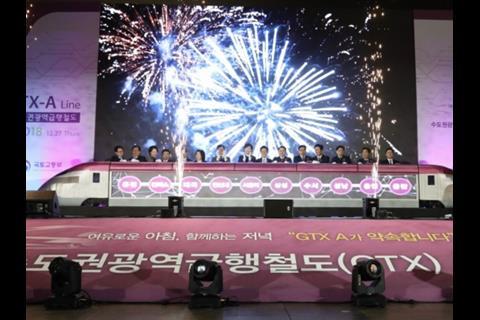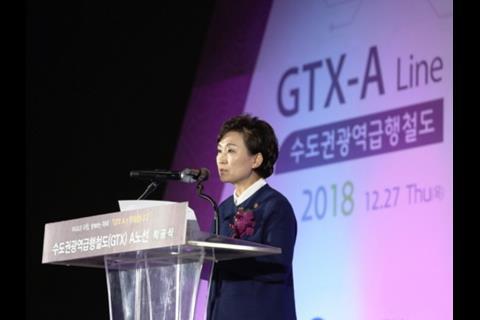SOUTH KOREA: Groundbreaking ceremonies for the northwestern arm of Seoul’s planned three-line Great Train Express network were held at the Kintex exhibition centre in Goyang on December 27.
According to the Ministry of Land, Infrastructure & Transport, the GTX network is intended to link outlying suburbs in the north and south of Gyeonggi Province, offering shorter journey times and reducing pressure on housing closer to the city. It will also serve four new towns announced in early December, which the government pledged would offer residents a commuting time of no more than 30 min.
Running entirely underground, GTX trains will operate at up to 180 km/h, offering end-to end commercial speeds of around 100 km/h. As well as reducing commuting times, the three new routes would relieve overcrowding on the capital’s metro network.
Expected to cost 3·6tr won, the 83·1 km GTX Line A linking Unjeong in the northwestern town of Paju to Dongtan in the southeast will serve 10 stations, and is scheduled to open in 2023.
A consortium led by Shinhan Bank was selected in April as preferred bidder for a privately-financed concession to develop the 43·6 km northern leg between Unjeong and Samseong.Infrastructure manager KRNA is already building the short link from Samseong to Suseo, from where GTX trains would share the existing high speed line used by Supreme Railways to reach Seongnam, Yongin and Dongtan.
Projected journey times are 20 min from Paju to Seoul against 80 min at present, and 16 min from Goyang to the city centre. Journey times from Dongtang to Samseong are projected to fall from 60 min to 22 min, with GTX services expected to start running on the high speed line from 2021.
‘For workers living in the greater Seoul area, it currently takes more than 90 min to commute’, explained Transport Minister Kim Hyun-mee. ‘I hope that the GTX will help people have a better commute.’
Under the GTX Phase 3 programme outlined by the ministry in 2016, all three routes are scheduled to be completed by 2025. Line B would link the Songdo district south of Incheon with Maseok to the east of the conurbation, while Line C would connect Suwon in the south to Deokjeong in the north.



















